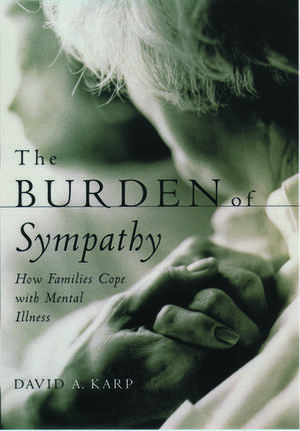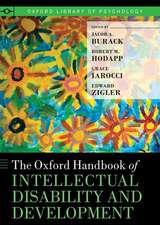The Burden of Sympathy: How Families Cope With Mental Illness
Autor David Karpen Limba Engleză Hardback – feb 2001
Preț: 557.51 lei
Preț vechi: 655.85 lei
-15% Nou
Puncte Express: 836
Preț estimativ în valută:
106.71€ • 115.95$ • 89.70£
106.71€ • 115.95$ • 89.70£
Carte tipărită la comandă
Livrare economică 10-16 aprilie
Preluare comenzi: 021 569.72.76
Specificații
ISBN-13: 9780195123159
ISBN-10: 0195123158
Pagini: 348
Dimensiuni: 146 x 217 x 29 mm
Greutate: 0.5 kg
Editura: Oxford University Press
Colecția OUP USA
Locul publicării:New York, United States
ISBN-10: 0195123158
Pagini: 348
Dimensiuni: 146 x 217 x 29 mm
Greutate: 0.5 kg
Editura: Oxford University Press
Colecția OUP USA
Locul publicării:New York, United States
Recenzii
"In this excellent, riveting work, David Karp explores the quandary of familial caregivers and how ethical obligations to those with emotional disturbances shed light on the ties that bind the whole of humanity together. I found in this remarkable book a clear moral vision ensconced in a series of page turning portraits depicting the mentally ill and of those who love them." --Lauren Slater, author of Prozac Diary and Lying: A Metaphorical Memoir
"David Karp has captured the essence of caring and caregiving in his fine book. For family members of individuals with schizophrenia, manic-depressive illness, and severe depression, he accurately describes 'the social tango between emotionally ill people and those who try to help them.' This will be a useful book for families of mentally ill individuals...I strongly recommend it." --E. Fuller Torrey, M.D., Executive Director, Stanley Foundation Research Programs, National Alliance for the Mentally Ill Research Institute, and author of Surviving Schizophrenia
"David Karp is a great ethnographer of disrupted lives, offering profound truths in clear prose, combining empathy with analysis. Burden of Sympathy gives eloquent voice to care givers; I know no other book that tells their story with such respect. This brilliant study offers personal validation, a model study of suffering and moral decision making, and a profound challenge to policy makers." -- Arthur W. Frank, Professor, Department of Sociology, University of Calgary and author of At the Will of the Body: Reflections on Illness and The Wounded Storyteller: Body, Illness, and Ethics
"The way in which Karp combines analysis with empathy makes this a difficult story told with great respect. This is a compassionate book and should be read by all those touched by mental illness within the family."
"David Karp has captured the essence of caring and caregiving in his fine book. For family members of individuals with schizophrenia, manic-depressive illness, and severe depression, he accurately describes 'the social tango between emotionally ill people and those who try to help them.' This will be a useful book for families of mentally ill individuals...I strongly recommend it." --E. Fuller Torrey, M.D., Executive Director, Stanley Foundation Research Programs, National Alliance for the Mentally Ill Research Institute, and author of Surviving Schizophrenia
"David Karp is a great ethnographer of disrupted lives, offering profound truths in clear prose, combining empathy with analysis. Burden of Sympathy gives eloquent voice to care givers; I know no other book that tells their story with such respect. This brilliant study offers personal validation, a model study of suffering and moral decision making, and a profound challenge to policy makers." -- Arthur W. Frank, Professor, Department of Sociology, University of Calgary and author of At the Will of the Body: Reflections on Illness and The Wounded Storyteller: Body, Illness, and Ethics
"The way in which Karp combines analysis with empathy makes this a difficult story told with great respect. This is a compassionate book and should be read by all those touched by mental illness within the family."
Notă biografică
David A. Karp is Professor of Sociology at Boston College. His book Speaking of Sadness: Depression, Disconnection, and the Meanings of Illness (OUP, 1996) won the Charles Horton Cooley Award from the Society for the Study of Symbolic Interaction. He lives in Chestnut Hill, Massachusetts.




















